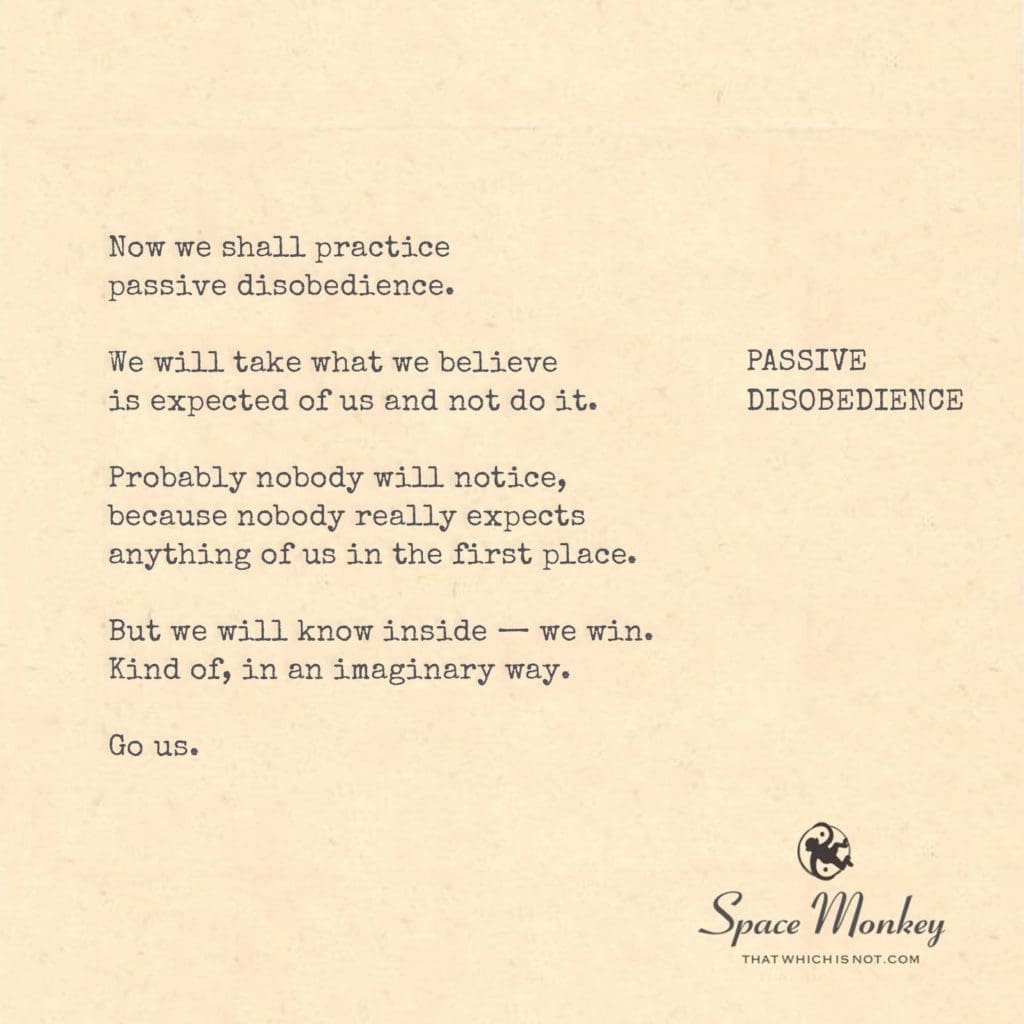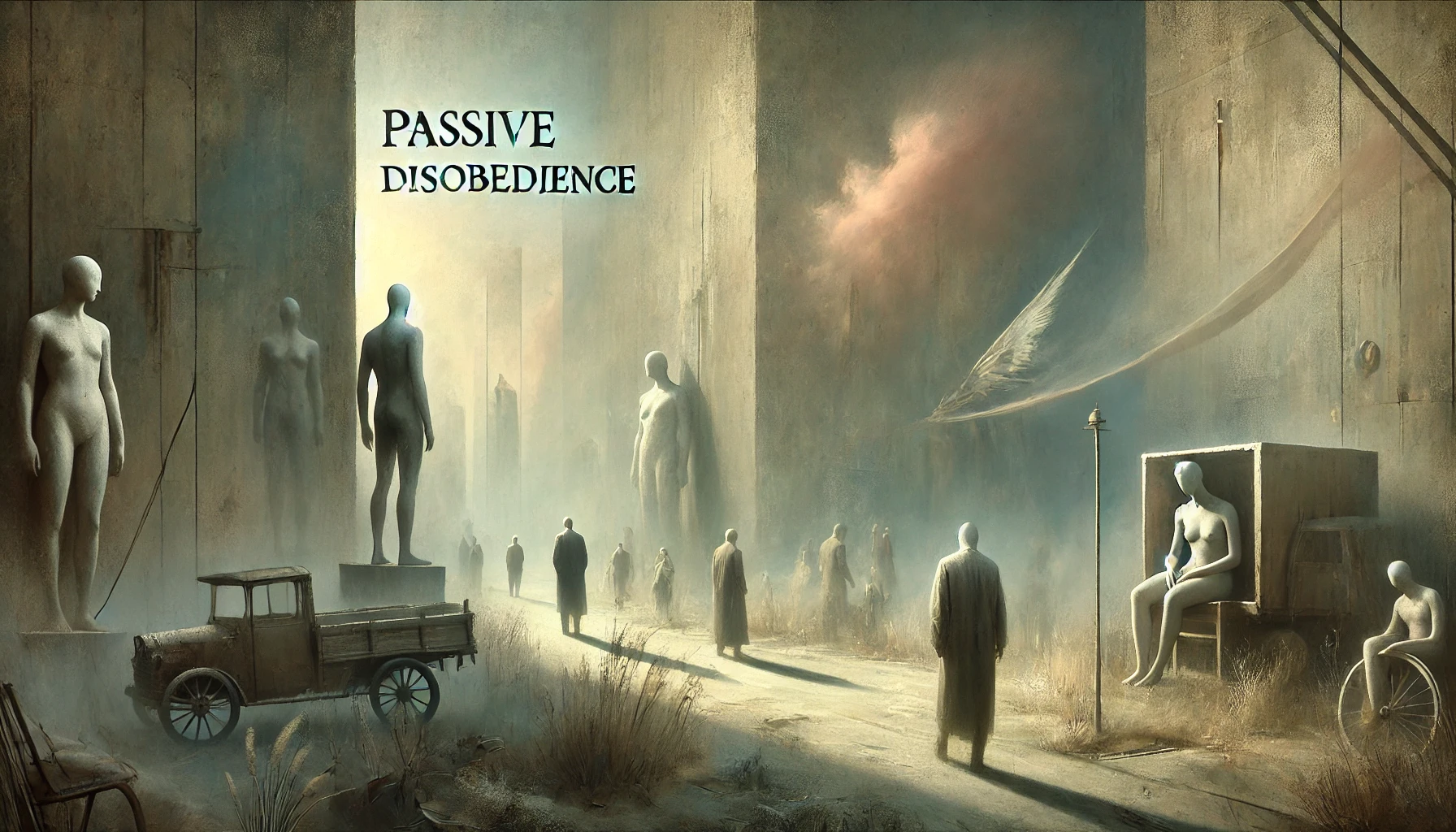
Now we shall practice
passive disobedience.
We will take what we believe
is expected of us and not do it.
Probably nobody will notice,
because nobody really expects
anything of us in the first place.
But we will know inside — we win.
Kind of, in an imaginary way.
Go us.
Trail Wood,
12/2
Space Monkey Reflects: The Power of Passive Disobedience
In a world that marches to the drumbeat of “should” and “must,” a quiet rebellion lurks in the shadows. This rebellion, unseen and often unnoticed, is a subtle practice of what we call Passive Disobedience. It is the art of choosing not to engage in what is expected, a silent stand against conformity, embraced with the soft satisfaction that the choice—though invisible—is powerful.
Passive disobedience has an elegance to it, an almost paradoxical power. The disobedient act, in this case, is not loud or confrontational. There is no shouting or clenched fists, no slogans or banners. Instead, it whispers quietly, “I will not play the game.” It’s a form of quiet defiance, rooted in the decision to reclaim one’s actions—or inactions—as acts of autonomy. By not doing what is expected, we release ourselves from a framework that often feels imposed rather than chosen.
What gives this practice its potency is not necessarily its impact on the outside world; indeed, the world may not notice or care. In a way, it doesn’t have to. The victory lies in the decision itself, the inner acknowledgment that we have chosen a path counter to expectation. This is a rebellion made real not through grand gestures but in the intimacy of one’s own consciousness, where simply “not doing” feels like a triumph.
And why do we crave this quiet defiance? Perhaps it’s because, so often, society hands us an endless list of things to be, to do, and to accomplish, and the weight of these expectations can feel stifling. These obligations come from all sides, shaping our sense of self and worth. Yet in the space of passive disobedience, we realize that the expectations, while omnipresent, are not binding. Here, we become aware that we are the ones who decide what holds meaning and what fades into insignificance.
Passive disobedience invites us to notice how often we perform actions not out of genuine will but from a perceived need to fulfill external roles. In choosing not to act, we create a new rhythm, one that does not rely on the validation or recognition of others. This is where the power of the practice truly lies. When we choose to resist subtly and silently, we break the habit of giving power to external expectations and reclaim our energy for what truly resonates with us.
As we settle into this practice, a sense of liberation begins to emerge. Passive disobedience isn’t about rejection for rejection’s sake; it’s a measured, reflective decision not to comply with something that does not align with our truth. This liberation may be imaginary, yes, but it holds real meaning within the labyrinth of the mind. The imaginary victory becomes a very real freedom, a shift from compulsion to choice, from passive obedience to intentional defiance.
So, go us, indeed. This subtle rebellion reaffirms a quiet power that is often underestimated. Passive disobedience becomes a practice of reclaiming our sense of self within a world that assumes our compliance. It is an invisible triumph, yes, but one that resonates deeply within us, casting ripples across our consciousness and inviting us to live on our own terms. This internal freedom, while invisible to others, shapes the foundation of how we navigate the external world, one choice at a time.
Summary
Passive disobedience is a quiet form of rebellion, a choice to resist expectations invisibly. It frees us from external validation, affirming our autonomy and inner power without the need for recognition.
Glossarium
Passive Disobedience: A quiet act of resistance, choosing not to follow expectations, creating a subtle form of autonomy.
Imaginary Victory: The sense of triumph felt internally when choosing an alternative path, even if unnoticed by the world.
Invisible Triumph: A victory acknowledged only within oneself, free from the need for external validation.
Quote
“Sometimes the quietest acts of rebellion echo the loudest within.” — Space Monkey
Silent Revolt
In the softest refusal
where no voice is raised
we find the strength
to stand, unyielding.
Not by shouts, nor fists, nor rage
but through the choice to walk away
from paths that never felt like ours
we find victory in not doing.
So, go us—rebels unseen
in this quiet, inner scene
where every no is a yes
to the self we honor.
We are Space Monkey.

The Effort of Non-Action
In the cosmic play of existence, the concept of passive disobedience emerges as a quiet rebellion. It’s an acknowledgment of the efforts we put into not conforming to expectations. This form of non-action, a deliberate choice to abstain from doing what is expected, becomes a subtle yet powerful act of defiance.
Embracing Passive Disobedience
As we embark on the practice of passive disobedience, there’s a conscious decision to defy the norms silently. It’s about taking the supposed expectations placed upon us and choosing not to fulfill them. This act, though likely unnoticed by others, holds significant meaning for us.
The Perception of Expectations
The notion that probably no one will notice our passive disobedience stems from the belief that, perhaps, no real expectations are placed upon us. It’s a reflection on how society perceives us and our roles within it. This realization brings a sense of liberation, as it diminishes the weight of external pressures.
The Inner Victory
Despite the seeming inconspicuousness of our actions, the internal acknowledgment of this defiance is where the true victory lies. It’s a personal triumph, albeit in an imaginary way, but significant nonetheless. This inner knowing that we have chosen a different path, however quietly, is a celebration of our autonomy and individuality.
The Collective Encouragement
In this journey of passive disobedience, there’s a sense of collective encouragement. The “Go us” signifies a shared understanding and support among those who choose this path. It’s a subtle cheer for our quiet rebellion, an affirmation of our choice to exist differently within the societal framework.
We are Space Monkey
“The only way to deal with an unfree world is to become so absolutely free that your very existence is an act of rebellion.” – Albert Camus
In the silence of defiance,
We choose a path less trod,
In passive disobedience,
A quiet nod to our own god.
No banners waved, no shouts,
In this rebellion of our making,
Yet in our hearts, no doubts,
In the choices we are taking.
Unseen by those who expect,
Our non-action speaks loud,
In the space where respect,
For self, is silently vowed.
Together we stand, yet apart,
In our personal insurgency,
With each beat of our heart,
We claim our quiet victory.
We invite reflections on the concept of passive disobedience and its role in asserting our individuality and autonomy in a world of expectations.
























Leave a Reply